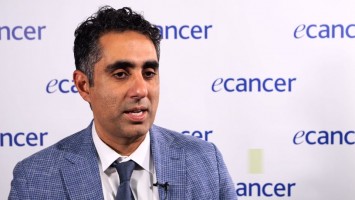The DYNAMIC-III study is really designed to explore the utility of using ctDNA, circulating tumour DNA, to guide therapy in stage 3 colon cancer. Stage 3 colon cancer, around 30% still recur despite standard chemotherapy after surgery, and we know that ctDNA detection in the blood after surgery indicates a very high risk of recurrence, so we want to investigate whether we can intensify the chemotherapy in the ctDNA-positive patient, and in the negative patient we want to see if we can withhold or lessen, de-intensify the chemotherapy.
We presented the results, the mature data, on the ctDNA-positive cohort. The study randomised patients to a group where we use ctDNA results to tell us what to do with the treatment and then the other group, the patient is blinded and the clinician is blinded to the ctDNA result.
What was the methodology and what were the findings?
The patients are randomised to the two groups and the blood test is done about week five to six after surgery. The treating clinician is to nominate what the standard of care chemotherapy will be before randomisation. The blood test is done as what we call a ctDNA tumour-informed approach, whereby the tumour tissue is sequenced, and then we find personalised mutations to track in patients that blood samples are done at John Hopkins lab.
If a patient has a positive test, they get a much more intensified chemotherapy, meaning if the clinician initially decided no chemo, they will receive single-agent fluoropyrimidine. If the initial is single-agent fluoropyrimidine, they go to a more stronger, two chemotherapy agent, doublet chemotherapy, and then doublet to triple chemotherapy option. The primary endpoint for the ctDNA-positive cohort is three year recurrence-free survival. We also looked at end of treatment ctDNA clearance, as well as safety and the ctDNA level, the impact on outcome.
I forgot to mention that in the standard of care group, the decision on chemotherapy is purely at the clinician’s discretion, as per standard of care.
What are the clinical implications of these findings?
When we look at the baseline characteristics of the trial, we had 129 patients enrolled to the ctDNA informed arm and 130 to the standard of care arm. The ctDNA positive rate in our study was 27% across both arms of the study.
There is some imbalance that I really need to highlight. There is more high-risk disease and lymph node N2 disease and tumour deposit in the ctDNA informed arm, however the result does suggest there is no significant difference between the outcome with treatment escalation or intensification of chemotherapy, compared to just standard of care chemotherapy. We also looked at comparing the triplet chemotherapy to doublet chemotherapy; again, we didn’t really see a difference in outcome.
This is a randomised phase II study, obviously, with a smallish sample size, so it is more hypothesis-generating. We really want to see whether there’s any signal that we can take it forward to a larger study. Unfortunately, we didn’t really find any signal here.
Some interesting results other than the primary outcome have come up. We did see that tumour molecular burden… so ctDNA level is highly prognostic, so we compared the outcome in patients with a very low level of ctDNA, and those who are very high. In fact, we divided them into quartiles, and we can see the recurrence-free survival progressively worsen as the ctDNA level increases. We also saw a correlation between the level of ctDNA and the ability to clear the ctDNA with chemotherapy.
The other thing that we found that was very interesting is that about 40% of patients still have a positive ctDNA about four to eight weeks after chemotherapy. When we did an end of treatment blood collection they were still positive. The patients who remained positive do a lot worse than patients that cleared their ctDNA with recurrence-free survival at three years: about 12% in the persistent group, compared to over 80% in the ones that cleared the ctDNA. That was very interesting, and it reflects the efficacy of the treatment.
Is there anything else you would like to add?
I think there are ongoing randomised trials, particularly in the US CIRCULATE-NORTH AMERICA is recruiting well I believe. A much larger trials which is definitively looking at the benefit of triplet versus doublet chemotherapy. I’d really like to see the results of the trial. Ours is small, I’d like to validate it in a larger trial.








